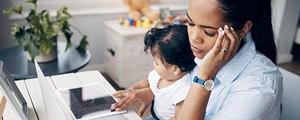Japanese workers are among the least engaged workforces in the world, according to Gallup’s recent State of the Global Workplace report. A mere 5% of Japanese workers in 2022 were engaged at work -- which means they are involved in and enthusiastic about their workplace -- contrasting sharply with the global average of 23%.
Japan's engagement rate has remained consistently low by global standards since 2009, the first year such data were available, fluctuating between 4% and 8%. It compares poorly against other high-income economies and against its geographic and culturally aligned neighbors.
In 2022, Japan’s engagement rate is less than one-third of the 18% average for workers in fellow Organisation for Economic Co-operation and Development (OECD) member states. This gap has been widening over the past decade, stretching from eight percentage points in 2009 to 13 points by 2022. Engagement levels in Japan are also typically lower than those in East Asia, where 17% of workers were engaged in 2022.
According to Gallup’s research, employee engagement is strongly connected to people’s wellbeing. Those who are genuinely engaged are thriving at work and playing a key role in driving the organization toward its goals.
Conversely, not engaged employees are those who are investing time but not energy or passion into their work. They put in the minimum effort required and are minimally productive. They are more likely than engaged workers to be stressed and burned out.
In Japan, 73% of workers are not engaged at work in 2022, compared with the global rate of 59%. Differences by gender only add to the situation’s complexity. Female workers in Japan are more likely than male workers to be not engaged (78% versus 69%), emphasizing a need for more inclusive policies.
Fewer Japanese Workers Than Average Enjoy What They Do
Given their relatively low engagement levels, it’s perhaps not surprising that Japanese workers are less likely than average to like what they do at work. Gallup, in partnership with the Wellbeing for Planet Earth Foundation, asks workers if they enjoy the work they do every day. The majority of Japanese who are employed for an employer -- 76% -- say they do, but this ranks Japan in the lowest third among 142 countries surveyed in 2022, and lags behind all other G7 countries.
Work enjoyment measures something different compared with more traditional metrics such as job satisfaction and employee engagement. While all of these are likely related, enjoyment is specifically how someone feels at work; satisfaction is how content they are; and engagement is how involved and enthusiastic they are with their workplace.
Understanding whether employees enjoy their work helps identify areas for improvement within the workplace and reveals underlying issues that may affect company culture. For example, low work enjoyment might point to a misalignment between employee values and organizational culture or highlight a need for more diverse and stimulating work assignments. It might also point to a need for cultivating meaningful relationships and building a supportive team environment, human connection or friendship.
Focusing on enjoyment in work also helps connect data with employees' sense of purpose, and how they themselves contribute to their overall wellbeing. As previously reported, those who enjoy their jobs rate their lives higher. When employees derive joy and satisfaction from what they do, it positively affects their mental and emotional state, and it is directly tied to higher wellbeing.
Career-Choice Perceptions and Job Market Confidence
Gallup and the Wellbeing for Planet Earth Foundation’s survey also explores whether people feel they have many choices in the type of work they can do. Interestingly, 73% of Japanese employed for an employer reported that they do, positioning Japan closer to the middle of all countries surveyed.
However, Japanese employees' outlook on the job market suggests they see options as somewhat limited in the near term. When asked if they believe it’s a good time to find a job where they live, just 25% of Japanese workers believed it was a good time, a figure significantly lower than the global average of 53%.
While the former metric provides a picture of how mobile and flexible people perceive their careers to be, the latter question assesses employees’ confidence in their local job market. The contrast between perceived career mobility and confidence in the job market is intriguing. While people in Japan may feel empowered in their skills and qualifications, they may at the same time feel constrained by external economic factors, including the overall economy, systemic issues in labor regulations, and a mismatch of skills and opportunities.
In addition, Japan's traditional “lifetime employment” culture (Shūshin koyō), though less prevalent now, may still be playing a role of shaping employee mindsets. This legacy could instill a sense of loyalty to an organization, potentially discouraging enthusiasm for change.
Japan’s Stressed Workforce
Managing workplace stress is vital for employers. Gallup World Poll asks people about their negative experiences in general, including anger, sadness, stress, worry and physical pain. Among the employed population in Japan, 42% reported experiencing stress during much of the previous day.
Since 2008, more of the Japanese population has consistently reported experiencing “stress” than any of the other negative experiences. Although experiences of worry are as common as stress worldwide, in Japan, as in many high-income countries, stress is a far more common emotion.
While stress can originate from a variety of sources, Japan's workplace culture, known for long hours, societal pressure against taking holidays, and rigid hierarchy, likely contributes to stress in the workplace. Addressing these issues could cultivate a positive and supportive workplace environment, mitigating stress and enhancing overall wellbeing.
The Road Ahead
Workplace wellbeing in Japan is not merely a theoretical concern but an essential aspect of organizational vitality. The unique challenges of low engagement, limited enjoyment, low confidence in job climate and high stress levels present both obstacles and opportunities.
It's vital for employers, policymakers and leaders to recognize and prioritize workplace wellbeing, shaping strategies that resonate with the intricate nature of this concept. Understanding and responding to these interconnected facets will be crucial in nurturing a dynamic, content and driven workforce, ultimately contributing to a more resilient and productive work environment in Japan.




